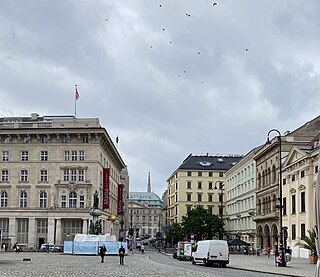
Refco was a New York City-based financial services company, primarily known as a broker of commodities and futures contracts. It was founded in 1969 by Raymond Earl Friedman as Ray E. Friedman and Co. Prior to its collapse in October, 2005, the firm had over $4 billion in approximately 200,000 customer accounts, and it was the largest broker on the Chicago Mercantile Exchange. The firm's balance sheet at the time of the collapse showed about $75 billion in assets and a roughly equal amount in liabilities. Though these filings have since been disowned by the company, they are probably roughly accurate in showing the firm's level of leverage.

BAWAG P.S.K. is the fourth largest bank in Austria. It was formed on October 1, 2005 by the merger of the separate banks P.S.K. and BAWAG.

HSBC Trinkaus & Burkhardt AG, operating as HSBC Deutschland, is a German financial services company. It traces its history back to 1785 and is one of the longest-established members of the HSBC Group. HSBC in Germany has operations in private, commercial and investment banking and asset management. HSBC has announced it would transfer ownership of HSBC Trinkhaus from UK-based HSBC Bank plc to Paris-based HSBC Continental Europe then to convert it into a branch of HSBC Continental Europe by end-2023.

The Chamber of Labour, is an organisation that represents the interests of 4 million Austrian employees and consumers. Membership is compulsory for all employees working in Austria, and it is thus not to be confused with Austrian labour unions, where membership is voluntary and which are organized in an umbrella organisation, the ÖGB. Together, the ÖGB and the Arbeiterkammer represent the interests of employees in the Austrian system of Sozialpartnerschaft, which plays a major role in the regulation of wages and prices.

Österreichische Postsparkasse was a postal savings bank in Austria. It was owned by the Austrian Post Office and thus by the government. It merged on 1 October 2005 with the BAWAG to form BAWAG P.S.K.
Bayerische Landesbank, also known as BayernLB, is a publicly regulated bank based in Munich, Germany and one of the six Landesbanken. It is 75% owned by the Free State of Bavaria and 25% owned by the Sparkassenverband Bayern, the umbrella organization of Bavarian Sparkassen. With a balance of €285,70 billion and 7,703 employees, it is the seventh-largest financial institution in Germany.

The Austrian Postal Savings Bank building is a famous building in Vienna, designed and built by the architect Otto Wagner. The building is regarded as an important work of Vienna Secession, branch of Art Nouveau.

Istrobanka was a universal commercial bank based in Slovakia established in September 1992.
Gerhard Scherhorn was a German Professor and economist.

In German-speaking jurisdictions, Landesbank, lit. 'bank of the Land', refers to a category of public sector banks that are owned by one or more of the Länder. Institutions of this type exist in most German states, as well as Austria and Switzerland.

The Raiffeisen Banking Group is a group of cooperative banks in Austria. The Austrian Raiffeisen banks are not consolidated under a single parent entity but are financially linked through a common institutional protection scheme and deposit guarantee scheme. The group's international operations, by contrast, are consolidated under Raiffeisen Bank International (RBI).

The banking system in Austria plays a pivotal role in the country's economy, ensuring financial stability and providing essential services to both individuals and businesses. The Austrian banking system is characterized by a three-tier structure, consisting of joint-stock banks, savings banks (Sparkassen), and cooperative banks.

Johannes "Hannes" Androsch is an Austrian entrepreneur and consultant; a former Social Democrat top politician who served as an Austrian Finance Minister from 1970 to 1981 and additionally as vice chancellor from 1976 to 1981; and a former banker who from 1981 to 1988 was the general director of the Creditanstalt-Bankverein and subsequently an advisor to the World Bank. From 1989 onward he built an industrial investment group, Androsch International Consulting (AIC), which is a major factor in Austria's internationally active corporate landscape. In addition, Androsch's foundation is an important sponsor of research and development activities in Austria, where he is regularly consulted on matters of political, economic and financial importance.
The Südwestbank AG is a regional bank in the southwest of Germany which is located in Stuttgart. The bank operates in the form of a stock corporation and looks after about 100,000 private and corporate customers in Baden-Württemberg. It was acquired in 2017 by Austrian bank BAWAG P.S.K..

Max banka a.s. is a Czech bank founded in 1991. It was formerly known as InterBank, InterBanka, BAWAG Bank CZ, LBBW Bank CZ and Expobank CZ. As of September 2022, Max banka is owned by Banka CREDITAS, which is part of the CREDITAS Group.

HYPO NOE Landesbank für Niederösterreich und Wien AG is an Austrian regional bank. It is one of the oldest and largest regional banks and was created in 1888.

The Anglo-Österreichische Bank, in shorthand Anglobank, was a bank founded in Vienna in 1863 with an extensive branch network in the Habsburg Monarchy and later in its successor states, primarily Austria and Czechoslovakia.

The Länderbank, full original name k. k. privilegierte Österreichische Länderbank, was a major Austrian bank, created in 1880. In 1922 its head office was moved to Paris under the name Banque des Pays de l'Europe Centrale, even though its activity remained overwhelmingly in the Austrian operations. After the 1938 Anschluss the latter came under control of Dresdner Bank by the name Länderbank Wien. It was nationalized in 1946, renamed Österreichische Länderbank AG in 1948, and eventually merged in 1991 with Vienna's Zentralsparkasse to form Bank Austria, which in turn has been a subsidiary of UniCredit since 2005.

The Wiener Bankverein or Bank-Verein was a major bank in the Habsburg Monarchy and the First Austrian Republic, founded in 1869. In 1888 it was the fourth-largest bank of Austria-Hungary by market capitalization, behind the Austro-Hungarian Bank, the Länderbank, and the Creditanstalt. It merged with the troubled Creditanstalt in 1934 to form Creditanstalt-Bankverein. Wiener Bankverein is thus one of the many predecessor entities of UniCredit, as the latter in 2005 acquired Bank Austria which itself had merged with Creditanstalt in 1997.

The German public banking sector represents a significant share of the broader banking sector in Germany. Unlike in most other Western and Central European countries, German public-sector banks have been present since the early phases of formalization of banking entities in the early modern period and have never lost their collective significance. They are typically referred to as one of the three “pillars” of the German banking system, the other two pillars being the cooperative banks and commercial banks.



















